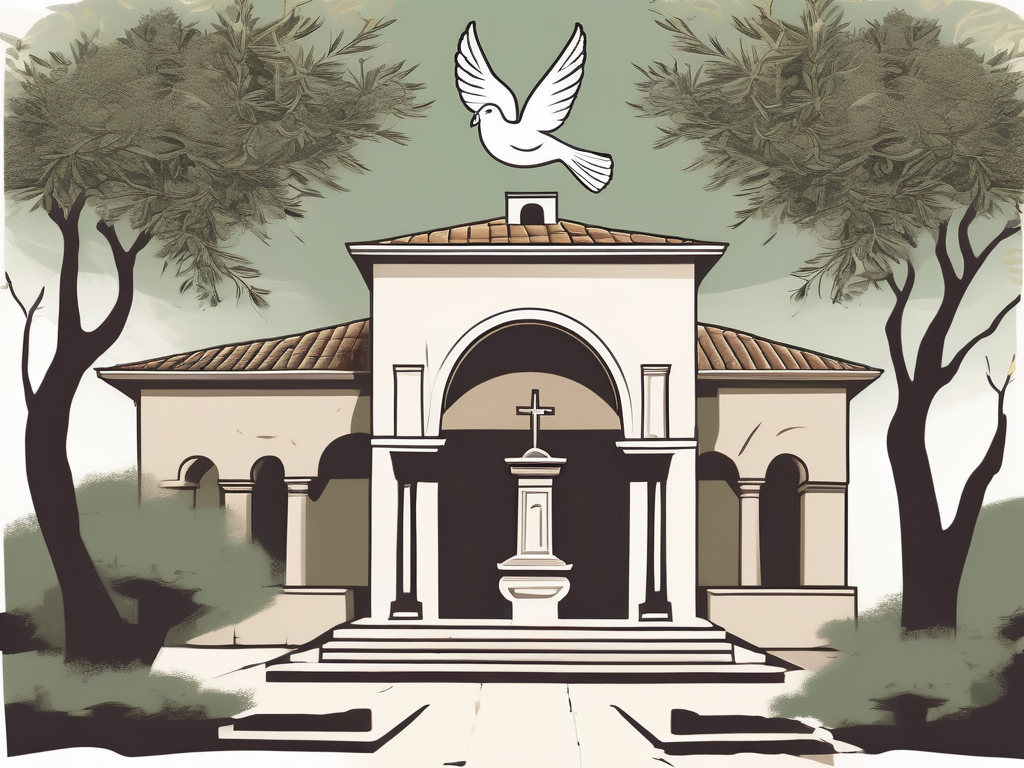In Christian theology, the phrase “Ye Must Be Born Again” holds significant meaning and has fueled much theological discussion and debate. This article aims to explore the different aspects of this phrase and shed light on its various interpretations.
Understanding the Phrase ‘Ye Must Be Born Again’
To grasp the meaning behind “Ye Must Be Born Again,” it is crucial to understand its historical context and its biblical references and interpretations.
Historical Context of the Phrase
The phrase “Ye Must Be Born Again” finds its origins in a conversation between Jesus and a Pharisee named Nicodemus, as documented in the Gospel of John. It reflects the teachings of Jesus regarding spiritual transformation and salvation.
Nicodemus, a respected Jewish leader, approached Jesus under the cover of darkness, seeking answers to his spiritual questions. In their conversation, Jesus explained that in order to see the kingdom of God, one must be born again. This perplexed Nicodemus, who questioned how a person could be born again when they are already old.
Jesus clarified that being born again refers to a spiritual rebirth, a transformation that occurs within a person’s heart and soul. It is not a physical rebirth, but rather a renewal of the spirit. This concept challenged Nicodemus’ understanding of religious practices and highlighted the need for a deeper, personal relationship with God.
Biblical References and Interpretations
Throughout the Bible, there are multiple references to being “born again” or experiencing a spiritual rebirth. This concept symbolizes a radical transformation in one’s life, emphasizing the necessity of a personal conversion to enter the kingdom of God.
In the book of Ezekiel, for example, God promises to give His people a new heart and a new spirit, removing their heart of stone and replacing it with a heart of flesh. This imagery of a new heart signifies a spiritual renewal, a transformation that enables individuals to live in obedience to God’s commands.
Interpretations of this phrase vary among different denominations and theological perspectives. Let’s explore some of these viewpoints.
Within evangelical Christianity, being “born again” is often associated with the concept of salvation through faith in Jesus Christ. It signifies a turning point in a person’s life, where they acknowledge their need for a Savior and place their trust in Jesus’ sacrificial death and resurrection.
In contrast, some denominations interpret being “born again” as a sacramental experience, closely tied to the act of baptism. They believe that through the sacrament of baptism, individuals are cleansed of their sins and receive the Holy Spirit, initiating their new life in Christ.
Other theological perspectives emphasize the ongoing process of being “born again” as a lifelong journey of spiritual growth and transformation. They view it as a continuous renewal of the mind and heart, as believers seek to align their lives with God’s will and cultivate a deeper relationship with Him.
Regardless of the specific interpretation, the phrase “Ye Must Be Born Again” serves as a powerful reminder of the need for spiritual renewal and transformation in the lives of believers. It challenges us to examine our hearts, surrender our old ways, and embrace the new life that comes through faith in Jesus Christ.
Theological Perspectives on Being ‘Born Again’
Various Christian denominations offer diverse interpretations of what it means to be “born again.” Let’s explore a few of these perspectives.
Protestant Views
In Protestant theology, being “born again” often refers to a conscious personal decision to accept Jesus Christ as one’s Lord and Savior. It signifies a spiritual awakening and a life transformed by the indwelling presence of the Holy Spirit.
This concept of being “born again” is deeply rooted in the Protestant Reformation, which emphasized the individual’s direct relationship with God. It is seen as a powerful experience of conversion, where one’s old self is crucified with Christ and a new self is born in the likeness of Christ.
Protestants believe that this transformation occurs through faith alone, apart from any sacramental rituals. It is a moment of profound spiritual rebirth, where the individual is filled with the Holy Spirit and receives the assurance of salvation.
Catholic Interpretations
In Catholic theology, the belief in being “born again” aligns with the sacrament of baptism. Catholics understand this phrase as referring to the initial purification from original sin through baptism. It is seen as the beginning of a lifelong journey of faith.
For Catholics, being “born again” is not just a one-time event but an ongoing process of growth in grace. Through the sacraments, especially the Eucharist and the sacrament of reconciliation, Catholics believe that they continually receive the grace necessary for spiritual renewal and transformation.
The Catholic Church also emphasizes the role of the community in the process of being “born again.” It is not just an individual experience but a communal one, where the entire body of Christ supports and nurtures the growth of each member.
Other Christian Denominations’ Understanding
Other Christian denominations, such as the Eastern Orthodox Church or the Methodist tradition, interpret being “born again” as a continuous process of spiritual growth and renewal. It involves a personal commitment to follow Christ and a deepening relationship with God.
In the Eastern Orthodox Church, being “born again” is closely tied to the sacraments of baptism and chrismation. Through these sacraments, individuals are initiated into the Church and receive the gift of the Holy Spirit, enabling them to participate in the divine life of God.
Methodists, on the other hand, emphasize the concept of being “born again” as a transformative experience of God’s grace. They believe that through faith in Jesus Christ, individuals are justified and receive the assurance of salvation. This new birth is accompanied by a change of heart and a desire to live a life of holiness.
Regardless of the specific interpretation, the concept of being “born again” is central to Christian faith and represents a profound spiritual transformation. It is a reminder of the transformative power of God’s love and grace in the lives of believers.
Metaphorical Interpretations of ‘Ye Must Be Born Again’
Beyond its literal and theological significance, the phrase “Ye Must Be Born Again” has been subject to metaphorical interpretations that emphasize spiritual transformation and personal development.
Spiritual Transformation
Some interpret being “born again” as a metaphor for a profound spiritual transformation. It represents a moment of awakening, where individuals experience a radical change in their perception of the divine and find purpose and meaning in their lives.
This transformative experience can be likened to a caterpillar’s metamorphosis into a butterfly. Just as the caterpillar undergoes a complete and radical change, shedding its old form to become a beautiful butterfly, being “born again” involves shedding old beliefs, habits, and ways of thinking to embrace a new spiritual reality.
During this process, individuals may experience a deep sense of liberation and freedom as they let go of past burdens and embrace a new way of being. It is a journey of self-discovery and self-realization, where one’s true essence is revealed and aligned with the divine.
Personal Growth and Renewal
For others, being “born again” symbolizes a continuous process of personal growth and renewal. It reflects the ongoing journey towards becoming the best versions of themselves, guided by their faith and a desire for a deeper connection with God.
Similar to the changing seasons, where nature undergoes cycles of growth, decay, and rebirth, being “born again” represents a perpetual cycle of personal transformation. It is a constant striving for self-improvement, learning from past experiences, and embracing new opportunities for growth.
This metaphorical interpretation emphasizes the importance of self-reflection, introspection, and self-awareness. It encourages individuals to examine their beliefs, values, and behaviors, and make conscious choices that align with their spiritual aspirations.
Just as a tree sheds its old leaves to make way for new ones, being “born again” involves letting go of old patterns and embracing new perspectives and attitudes. It is an invitation to embrace change, embrace personal development, and embrace a life of purpose and fulfillment.
Controversies and Misunderstandings Surrounding the Phrase
The phrase “Ye Must Be Born Again” has not been without controversy and misunderstandings. Let’s explore some of the common misconceptions and theological disputes surrounding this phrase.
Common Misinterpretations
One common misconception is equating being “born again” with mere external rituals or a superficial religious experience. The true essence of this phrase lies in the inner transformation of the heart and soul.
When Jesus used the phrase “born again” in his conversation with Nicodemus, a Pharisee and member of the Jewish ruling council, he was not referring to a physical rebirth or a literal return to the mother’s womb. Instead, Jesus was emphasizing the need for a spiritual rebirth, a profound change that occurs within a person’s innermost being.
Unfortunately, over time, some individuals and religious groups have reduced the concept of being “born again” to a set of external actions or rituals, such as baptism or reciting certain prayers. While these practices can be meaningful expressions of faith, they should not be mistaken as the sole indicator of a genuine spiritual transformation.
The true significance of being “born again” lies in the transformation of the heart and soul. It involves a deepening relationship with God, a surrendering of one’s will to His divine guidance, and a lifelong journey of growth and renewal.
Theological Disputes
The interpretation of being “born again” is a subject of theological dispute among different Christian traditions. These disagreements often stem from different understandings of salvation, grace, and the role of human agency in the process of spiritual transformation.
Some Christian denominations emphasize the role of human agency in the process of being “born again.” They believe that individuals must actively choose to accept Jesus Christ as their Lord and Savior, and that this decision is crucial for their salvation.
On the other hand, other Christian traditions emphasize the role of God’s grace in the process of being “born again.” They believe that it is God who initiates and enables the spiritual rebirth, and that human beings can only respond to God’s invitation with faith and obedience.
These theological disputes have led to different interpretations and practices surrounding the phrase “born again.” While the disagreements may seem divisive, they also reflect the richness and diversity of Christian thought and the ongoing quest to understand and live out the teachings of Jesus.
Ultimately, regardless of the theological debates, the phrase “Ye Must Be Born Again” serves as a reminder of the transformative power of God’s love and the invitation to experience a new life in Christ. It calls individuals to seek a deeper relationship with God, to surrender their old ways of living, and to embrace the abundant life that comes from being born again in the Spirit.
The Impact of ‘Ye Must Be Born Again’ on Christian Faith
Understanding the meaning of being “born again” has a significant impact on Christian faith, influencing evangelism, conversion, and shaping Christian practices and beliefs. Let’s delve into these aspects.
The concept of being “born again” is not a new one in Christian theology. It traces its roots back to the teachings of Jesus Christ himself, who spoke to Nicodemus, a Pharisee and member of the Jewish ruling council, about the necessity of being born again to enter the kingdom of God. This profound encounter between Jesus and Nicodemus has reverberated throughout Christian history, leaving an indelible mark on the faith.
When we talk about the impact of being “born again” on Christian faith, we cannot overlook its role in evangelism and conversion. The idea of being born again serves as a powerful invitation for individuals to experience a personal encounter with Christ. It is an invitation to leave behind the old life of sin and embrace a new life of faith and righteousness. This transformative experience is often described as a spiritual rebirth, where individuals are filled with a renewed sense of purpose and a deep longing to follow Christ.
Moreover, the belief in being “born again” has shaped various Christian practices and beliefs. One of the most prominent examples is baptism. In many Christian traditions, baptism is seen as a symbolic act of being born again, a public declaration of one’s faith and commitment to Christ. It is a powerful symbol of dying to the old self and rising to a new life in Christ.
Furthermore, the understanding of the Holy Spirit is closely intertwined with the concept of being “born again.” The Holy Spirit is believed to be the agent of this spiritual rebirth, working in the hearts and lives of believers to bring about a radical transformation. The Holy Spirit empowers and guides individuals on their journey of faith, enabling them to live out the new life they have received through being born again.
Additionally, the idea of spiritual renewal is deeply connected to the belief in being “born again.” It emphasizes the continuous process of growth and transformation in the life of a believer. Being born again is not a one-time event but an ongoing journey of spiritual renewal, where individuals are constantly being shaped and molded by the Holy Spirit into the image of Christ.
In conclusion, the impact of being “born again” on Christian faith is profound and far-reaching. It influences evangelism and conversion by inviting individuals to experience a personal encounter with Christ. It shapes various Christian practices and beliefs, such as baptism and the understanding of the Holy Spirit. And it underscores the importance of spiritual renewal, reminding believers that being born again is not a one-time event but a lifelong journey of growth and transformation.
Conclusion
The phrase “Ye Must Be Born Again” carries profound meaning within Christian theology. Its significance spans historical, theological, metaphorical, and practical dimensions. Understanding the diverse interpretations and impact of this phrase enriches our comprehension of the transformative power of faith and the pursuit of a vibrant Christian life.












